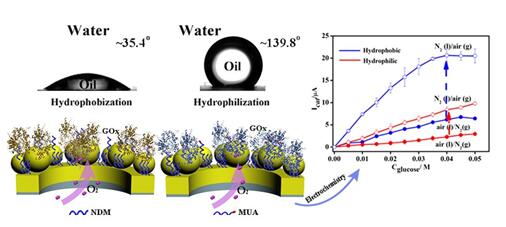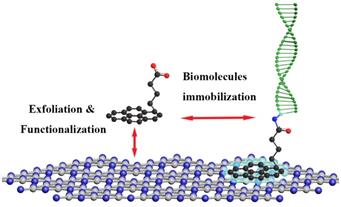Recently, Prof. Liu Songqin and Prof. Zhang Yuanjian, both of the College of Chemistry and Chemical Engineering of Southeast University and the Engineering Laboratory of Carbon-rich Materials Devices of Jiangsu Province, have made significant progress in the construction and functionalization of new nano-interfaces. Research results have recently been published in the top international journal "JACS". Many chemical reactions and biochemical processes require gas participation, such as oxygen. Due to the extremely low solubility of these gases in aqueous solutions, the efficiency of the reaction is greatly limited. In order to increase the reaction rate, the conventional method increases the solubility of the gas by increasing the contact area or increasing the pressure, but the process is often complicated and the performance improvement is limited. To this end, Prof. Liu Songqin's group constructed a gas-solid-liquid three-phase interface structure with an infiltrating and adjustable nature, which allows gas molecules to reach the active center of the enzyme from the gas phase through the hydrophobic nanochannels and participate in the catalytic reaction. Increased 80 times. This three-phase interface with adjustable wettability can be used for gas-solid-liquid three-phase reaction and industrial catalysis. The research results are published in the Journal of the American Chemical Society. The first author of the dissertation was Dr. Mi Li, a doctoral student of 2014, and the author of the correspondence. Professor Liu Songqin and Professor Tian Ye, Institute of Chemistry, Chinese Academy of Sciences. In another development, Professor Zhang Yuanjian's research group recently made important progress in the two-dimensional carbon nitride spontaneous stripping and interface non-covalent functionalization. Carbon nitride is a two-dimensional polymer material with a graphite-like structure and is widely used in photocatalysis and electrochemiluminescence sensing. However, the conventional carbon nitride nanosheet preparation method is inefficient and its surface is chemically inert, which restricts further application and development. For this reason, the research group used the non-covalent interaction between the aromatic molecules and carbon nitride to achieve spontaneous stripping and surface functionalization of carbon nitride using simple mechanical grinding. This method not only maintains the basic properties of the original carbon nitride but also optimizes the nanosheet interface. In addition, the research group also proposed the preparation of surface-modified carbon nanofibers by hydrolysis, using their reversible assembly behavior to achieve reversible enrichment and release of adsorbed species. Compared with common adsorbents such as three-dimensional graphene and activated carbon, the material not only has a considerable adsorption capacity (402 mg/g), but also exhibits a high selectivity and low energy consumption regeneration advantages. These findings address the challenges faced by carbon nitride nanoplates in biological analysis. The research results were published in the American Chemical Society and the American Chemical Society ACS Nano. The first authors of the thesis were Ji Jingjing, a doctoral student of 2015 grade, and Zhang Yuye, a graduate student of the 13th Zhibo, and the author of the correspondence was Professor Zhang Yuanjian. The above research work has received substantial funding from the National Fund Committee, the “Year 1000 Talents Plan†of the Central Organization Department and the Science and Technology Department of Jiangsu Province. The Jiangsu carbon-rich material device engineering laboratory was approved by the Jiangsu Provincial Development and Reform Commission in 2016. It is managed by the Southeast University, and is operated on the scientific hardware of the School of Chemistry and Chemical Engineering of Southeast University and the Analytical Testing Center. The laboratory has a group of Southeast University Chemistry. Teachers and students of the School of Chemical Engineering are the most prosperous, dynamic and team-oriented researchers. The laboratory aims at macro-preparation of carbon-rich and other energy materials and application of their devices, and carries out research work on the synthesis, interface modification, and photoelectric modification of functional carbon-inorganic hybrid materials, etc. It is applied in the fields of new energy, photocatalytic degradation of organic pollutants, rapid detection of atmospheric pollutants, and toxicity mechanism research. (Liu Enran) Tea Strainer Silicone,Silicone Tea Strainer,Silicone Tea Bag Infuser,Silicone Tea Steeper YANGJIANG VOSSEN INDUSTRY AND TRADE CO.,LTD , https://www.cnvossen.com

